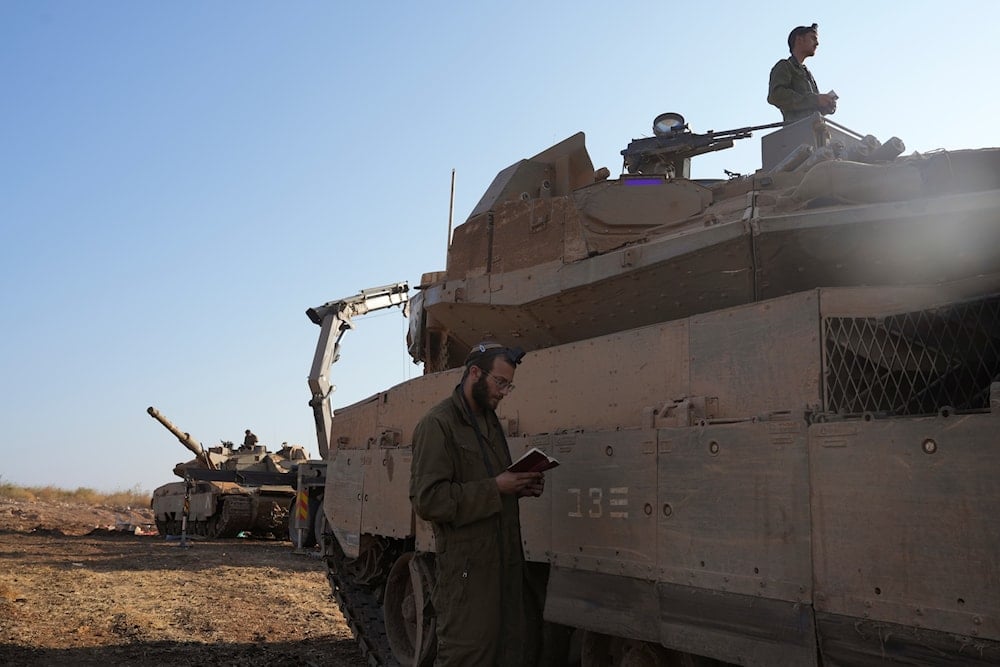CNN slammed for report on IOF mental health issues due to Gaza war
The report on the mental health struggles of Israeli soldiers who returned from Gaza, ignited widespread outrage among journalists, academics, and human rights advocates.
-

Israeli soldiers at a staging area in northern occupied Palestine on October 6, 2024. (AP)
CNN has come under heavy fire for a recent piece highlighting the mental health struggles of Israeli occupation soldiers returning from Gaza, with critics accusing the network of whitewashing the actions of the Israeli military while downplaying the immense suffering of Palestinians, Anadolu Agency reported.
The article, which delved into the trauma and suicide risks faced by Israeli soldiers post-combat, ignited widespread outrage among journalists, academics, and human rights advocates. Much of the backlash focused on the sympathetic portrayal of a bulldozer operator involved in military operations, which critics argue glosses over the devastating impact of those actions on Palestinian civilians.
"It's incredible that high-level journalists approved and published that piece," said Heidi N. Moore, an independent financial columnist who previously worked for The Wall Street Journal and The Guardian. She described the article as "a complete debacle."
Jehad Abusalim, executive director of the Institute for Palestine Studies, condemned Western media's approach to covering the war. "Western media outlets like CNN run stories that humanize these criminals by focusing on their personal struggles with trauma."
The piece also reignited debate about media responsibility in conflict coverage, with anthropologist Jason Hickel calling the framing "breathtakingly evil." Palestinian journalist Mariam Barghouti pointed out that Israeli soldiers are "blatantly sharing their crimes not just on TikTok, but now on CNN too."
The article has generated significant social media engagement, with one critical post by American rapper and songwriter Soul Khan receiving tens of thousands of likes. He said the article "really is one of the most horrifically irresponsible pieces of journalism" he has ever seen.
Several X users pointed to broader concerns about media narratives. "CNN tried to do a sympathy piece on IDF (Israeli army) soldiers and then like halfway through the article you find out this guy was a D9 bulldozer driver who regularly drove over people while they were alive," wrote X user in one of many viral responses criticizing the piece.
Trauma, suicide plaguing Israeli soldiers upon return from Gaza: CNN
Earlier this week, a mother of an Israeli soldier who committed suicide told CNN that what he saw in Gaza may have haunted him.
According to the mother, Eliran Mizrahi returned as a "different person", traumatized by the war on Gaza and often describing seeing "invisible blood" to his family. “Because of the army, because of this war, my brother is not here," his sister stated.
Mizrahi spent 186 days operating a D-9 bulldozer before being injured by an RPG attack. After being pulled out for treatment, he was diagnosed with PTSD in April and began receiving weekly therapy. Two days before he was to return, he killed himself.
The Israeli occupation has revealed it provides care for thousands of soldiers suffering from post-traumatic stress disorder or mental health issues resulting from their experiences in the war on Gaza. The Israeli military has not given an official number of how many members have committed suicide, but one medic told CNN anonymously that many "do not trust the government right now."
Israeli soldiers who fought in Gaza told CNN that they witnessed horrors that the outside world could never truly understand.
Data show that more than a third of Israeli soldiers who have been removed from combat suffer from mental health issues. The Israeli Ministry of Security's Rehabilitation Department noted that every month, over a thousand new soldiers are removed from combat for treatment, with 35% complaining about their mental state and 27% experiencing “a mental reaction or post-traumatic stress disorder.”
By the end of 2024, nearly 14,000 wounded Israeli soldiers are expected to receive treatment with 40% likely to face mental health issues. An Israeli military medic told CNN that some young soldiers experienced mental trauma and often cried or showed signs of emotional numbness.

 4 Min Read
4 Min Read








